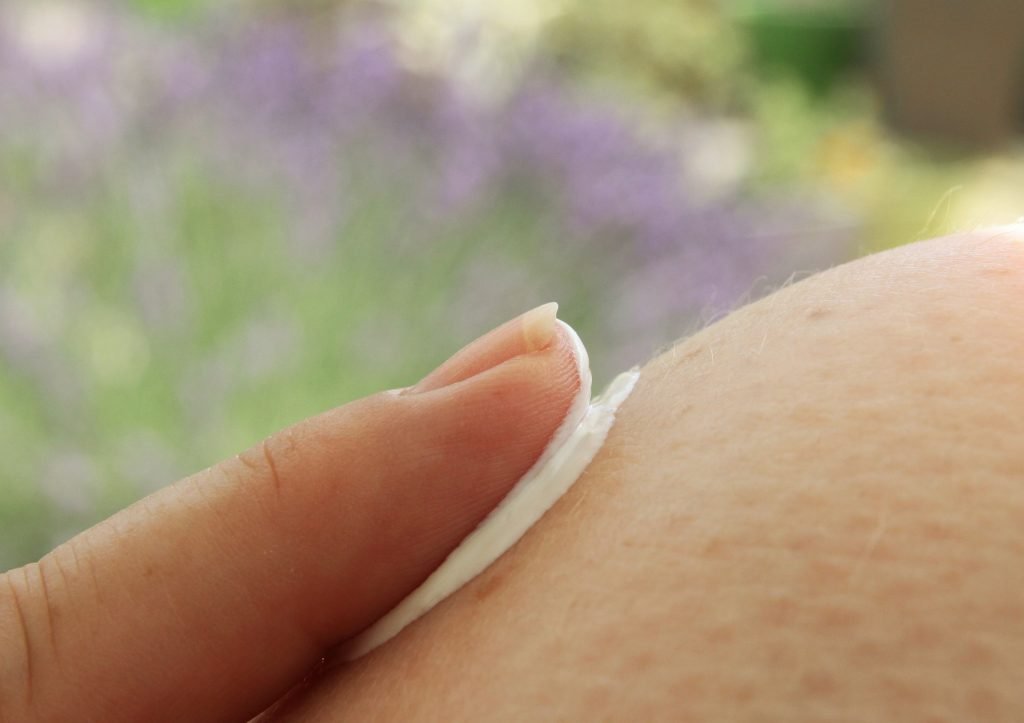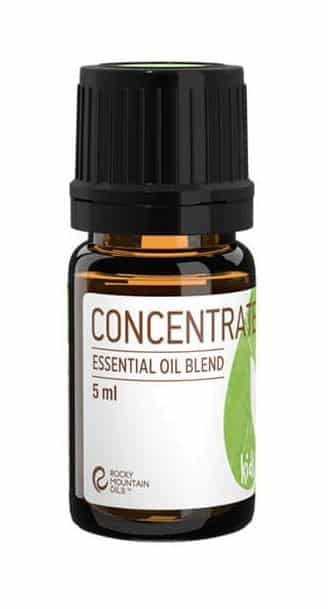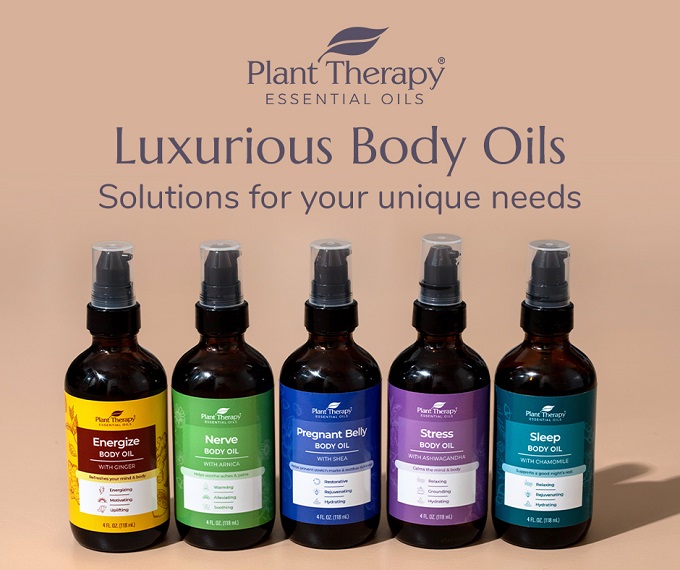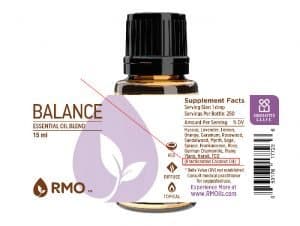 Applying essential oils “neat” means putting essential oils directly onto your skin without dilution with a carrier oil.
Applying essential oils “neat” means putting essential oils directly onto your skin without dilution with a carrier oil.
Neat = Undiluted = Full Strength.
Many people use lavender oil and tea tree in this way.
While the practice of applying essential oils neat may be recommended by wellness advocates, aromatherapists or authors, the question remains: should you really do it?
It is a very controversial topic, and I want to give you all the information I can, before you decide for yourself.
Undiluted Essential Oils On Your Skin
For anyone starting out, the answer is simple: Do not apply essential oils undiluted onto your skin. Not even Lavender.
Now, experienced aromatherapists work with individual clients much like other medical professionals would. There are client intake forms, an analysis of health history, a questionnaire about current medications or supplement routines, etc.
With such detailed, 1-on-1 information, aromatherapists may make the recommendation of applying certain oils, for a certain amount of time, in their neat version.
It is only with this extensive professional guidance, that I would also use or recommend applying essential oils neat.
Here’s why:
Highly Concentrated
Essential oils are a wonderful part of holistic medicine. I am not trying to scare anyone out of their use.
But we have to remember that essential oils are extremely concentrated liquids.
Treat essential oils with the same respect and diligence as traditional medicines you might use.
I always refer to my stash of essential oils as my “medicine cabinet” of essential oils – and rightfully so. I use my oils for a wide range of day to day ailments.
But when I reach for them, I know in my mind (and my heart), that I am using nature’s medicine, and not just some perfume or nice-smelling “stuff”.
Treat your oils with respect, and they will treat you well in return!
Skin Irritation

Be careful of neat application of essential oils. It may lead to itchy, irritated skin.
Because essential oils are so concentrated, they can severely irritate your skin if used neat.
Skin irritations look like redness, rashes, itching, or even skin tears.
- Redness: The skin may appear redder than usual, indicating inflammation or irritation.
- Swelling: There can be noticeable swelling or puffiness, especially if there’s an allergic reaction.
- Itching: Irritated skin often itches, leading to discomfort and the urge to scratch.
- Burning Sensation: There might be a feeling of warmth or a burning sensation on the area where the essential oil was applied.
- Rash: A rash or small bumps may develop. This can be a sign of allergic contact dermatitis (1).
- Dryness or Flaking: The skin may become overly dry and start to flake or peel as a reaction to the irritant.
- Sensitivity to Sunlight: Some essential oils, particularly citrus oils, can make skin more sensitive to sunlight, leading to quicker sunburns or photoallergic reactions.
If you’re suffering irritated skin, start immediately massaging any carrier oil into the irritated area. This helps to relieve some of the essential oils’ potency, and helps to dilute it after the fact that it’s already been applied.
I know, sounds weird, but I have seen this work beautifully once with a lemon skin irritation I got myself into. (Don’t ask… or maybe do. I put too much lemon essential oil in my bath water.)
Permanent Skin Sensitization
In addition to short term skin irritation, you may also put yourself at risk for permanent skin sensitization issues from using essential oils neat.
Wendy Robbins from aromaweb.com has been working with essential oils for over 20 years. On her website (2), she references a case study showing permanent skin sensitization due to using Lavender essential oil directly on the skin.
The original case study is from a book titled “Essential Oils and Aromatics” by Marge Clark. Marge is the actual person that has permanent skin sensitization from Lavender EO.
You can find her book on Amazon Kindle for under $5 if you’re looking for a well-educated read.
Cost Savings
Diluting essential oils is not only recommended to protect your well-being, it also saves you money!
The most common dilution percentage is 2%. This means, 2% of what you apply to your body will be essential oil, the remaining 98% is carrier oil.
If instead of diluting, you applied essential oils neat, that would mean 100% essential oil and 0% carrier oil.
In terms of cost, essential oils are more costly than carrier oils.
So without any more math, using oils neat is more expensive than using them diluted.
Never Use Hot Oils Undiluted On Your Skin
Some essential oils create a warming sensation throughout your skin when applied topically.
These oils are called “hot” essential oils, and include:
- Oregano
- Thyme
- Cloves
- Cinnamon Bark
- Cassia
Never never ever apply those oils to your skin topically without dilution.
This includes blends that have one (or more) hot oils included in their recipe.
Skin Patch Testing

Do a Skin Patch Test before Applying any Essential Oils Topically.
A skin patch test is the simplest way to learn whether an essential oil is OK for you to use.
A skin patch test is recommended for first-time uses of anything new to your skin. That way, you can test your skin’s response before applying new product liberally.
To perform a skin patch test:
- Select a small area of sensitive skin, like the inside of your wrist or the inside of your elbow. The skin is quite thin there, so if the product you are testing is going to cause problems for you, it’ll very likely show up in those areas.
- Apply a small amount of the product to this area.
- Wait 24-48 hours for complete results, without washing it off. Look for any signs of irritation such as redness, itching, swelling, or rash.
- If irritation occurs, remove the product immediately and discontinue use.
- If nothing happens, the product is likely safe for use on the rest of the body.
Please consult your dermatologist if you find you have particularly difficult skin, and need more personalized care and recommendations.
When Companies Advertise Neat Blends

Rocky Mountain Oils’ Concentrate Neat Blend
Get It Here
The term neat simply means undiluted.
When an essential oil company such as Rocky Mountain Oils advertises neat blends, this does NOT mean that you can apply these oils to your skin undiluted.
It simply means that the bottled oil blend is undiluted, as opposed to being stretched with Fractionated Coconut Oil (FCO) like in a roll-on bottle.
Some blends are diluted with Fractionated Coconut Oil because they contain luxury essential oils as part of the recipe. Diluting a blend helps to keep the price affordable for customers.
For example, “Balance” by Rocky Mountain Oils contains Fractionated Coconut Oil. It also contains Sandalwood and Rose, both of which are super expensive oils.
The fact that the blend is stretched actually doesn’t bother me, because then I know for sure that the essential oils used in it are pure and 100% real. If you ever see an essential oils company can sell Sandalwood or Rose for under $20, beware! Following all best practices for quality and sourcing, and actually using real plant materials and not synthetic fragrances, that is simply not achievable.
So – I love Rocky Mountain Oils! They offer a beautiful selection of essential oils and synergies.
But make sure to buy the neat version if you plan to mainly diffuse it – and start reading bottle labels please.
Final Thoughts
The way you use essential oils in your life is completely up to you!
I hope my thoughts on neat application and skin sensitivities will help you enjoy their advantages in the safest and most effective way possible.

Resources
- Contact Dermatitis (Mayo Clinic)
- Guide to Diluting Essential Oils (AromaWeb)
- Essential Oils and Aromatics (Handbook)




Anni
Thanks for the article! I have been trying to figure out how to enjoy Eucalyptus without the expense. I have been enjoying it neat and suffered some burns but that lead to me soaking old t-shirts with it so that I could enjoy the vapor. I do enjoy the cooling sensation when it’s poured on the back of my hand. But yes it’s very expensive. I think I will switch it up by diluting in carrier oil and see if I enjoy it still.
Amanda @ Healthy House on the Block
This is so helpful and informational. I’m so glad I came across your post. I’ve been reading a lot of recommendations on using Frankincense neat for wrinkles, etc. We always dilute our oils, especially for the kids, so it seemed odd. Thank you so much for sharing this information!